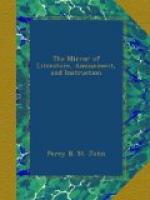I rallied: my feelings were unmanly. The moon had risen in unclouded brilliancy, gleaming on the heaving and rippled surface of the dark blue main; I looked up to the tranquil firmament, and the reflection was bitter. Pealing along with the voice of the ocean, the wild and lofty strains from the singular figure aloft, like a gentle brook commingling its waters with a vast and rapid river—failed not during this time to keep up my excitement. The sea was now fast covering the shingles; one chance was yet before me, which the instant I reflected on, I hesitated not to put into execution. It could at worst be only exchanging one death for another, and death would have been a boon indeed, rather than the longer endurance of that deeply agonizing state of suspense. I can fancy my faithful dog, by his actions, had anticipated this resolution: his joyful bark as I sprung forward into the waves, still rings in my ear. He was a dog of prodigious size and strength: holding by his shaggy neck with one hand, I assisted myself in swimming along by him with the other, intending after clearing the mouth of the cove, to make for the opening in the rocks to landward. I felt invigorated with new life, though the chances against me were still precarious, on account of the distance, as we went through the plashing waves with the broad expanse of ocean again before me. The sea was now tolerably calm along shore, for the tide was far advanced, and I had hardly swam twenty yards from the mouth of the cove when a Landwithiel fishing-boat came in sight almost within hail. An involuntary prayer came to my lips; I sung out with all the energy which the hope of life could produce; she was alongside in a trice, and in a few minutes I was sailing for Landwithiel Pier, merrily, at the rate of eight knots an hour. I found on detailing my adventure, which greatly surprised the fine fellows who picked me up, that the cove was called Dawlish’s Hole; and that the apparition of the white lady on the rocks was one of flesh and blood, not an airy vision.
“Poor Ellen Dawlish,” said Sam Clovelly, my informant, “once the pride of the parish—poor thing! her day has long since gone by; she is always worse when the moon’s full; but it’s a long yarn, sir, and you’ll learn all about her and the wild skipper, as we used to call him, (that’s her husband) far better up at the “Ship-Aground” yonder, than I can tell you.”




